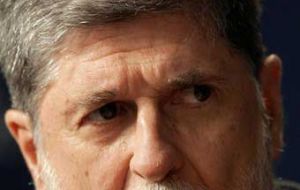MercoPress. South Atlantic News Agency
Brazil wants WTO agreement on July consensus
 Minister Celso Amorim
Minister Celso Amorim Brazilian Foreign Minister Celso Amorim warned on Tuesday that global trade talks would fail if members of the World Trade Organization tried to revise positions they had reached last July.
The WTO is considering whether to hold a ministerial-level meeting in Geneva in coming days to advance talks that collapsed in July over safeguards to protect domestic farmers from a flood of food imports. But that meeting produced preliminary agreement in several areas, including an outline of possible tariff reductions on manufactured products. "Any attempt to rebalance the July package will result in failure," Amorim said. The United States wants Brazil, India and China to commit to taking part in deals eliminating tariffs in individual sectors such as chemicals but the big emerging countries say participation must be voluntary. "Any attempt at this time to convert the basis of sectorial talks from something voluntary to obligatory ... we better not go to Geneva at all" Amorim said in Brasilia. As a key farm goods exporter Brazil has played a key role in the talks, attempting to forge a common front of developing countries in the so-called G20 group. The latest revisions of two papers including what could become the formulas for cutting tariffs and trade-distorting agricultural subsidies in a final deal were issued on 6 December 2008. They are the outcome of the latest discussions in negotiation groups and would be a focus of crucial talks if a representative group of ministers return to Geneva later in December. According to the WTO site the two documents are revisions of drafts previously circulated in July 2007, and May, February and July 2008 and are the result of WTO member governments' latest positions in the discussions since September 2007, one of the most intensive periods of negotiations since the Doha Round talks began in 2001. The latest drafts also try to capture agreement reached tentatively on some subjects when a group of ministers came to Geneva in July 2008 and tried but failed to reach agreement on these issues. The texts are agriculture negotiations chairperson Ambassador Crawford Falconer's and non-agricultural market access (NAMA) chairperson Luzius Wasescha's latest draft "modalities". The papers are the chairs' assessment of what might be agreed for the formulas for cutting tariffs and trade-distorting agricultural subsidies, and related provisions. After these "modalities" have been agreed, members will apply the formulas to their tariffs and agricultural subsidies. The two papers were circulated at about the same time because members link the two subjects. Members now intend to move to a new phase where these areas of the Doha Round can be negotiated in comparison with each other with the hope that agreement can be reached later in December 2008, when a representative group of ministers could be in Geneva. As well as reaching agreement within each subject, members also want to negotiate an acceptable balance between the depths of cuts (the "level of ambition") in agricultural and non-agricultural tariffs and agricultural subsidies as well as the size of cuts that they desire in each area. Drawn from WTO member governments' positions over several months of the negotiations, these are not "proposals" from the New Zealand and Swiss ambassadors in the sense that "proposals" are normally understood. In other words, these are not the chairs' opinions of what would be "good" for world agricultural and non-agricultural trade, but what might be accepted by all sides in the negotiations.




Top Comments
Disclaimer & comment rulesCommenting for this story is now closed.
If you have a Facebook account, become a fan and comment on our Facebook Page!